Things In My Home: Arabic Vocabulary from al-Kitab al-Asasi Book 1
Today, you are going to study lesson 9 from al-kitab al-asasi volume 1 book.
You'll know the Arabic vocabulary about the things in your home, they are family, room, and things in my home (furniture).
أُسْرَةٌ (Family): Family member in Arabic
أَبٌ : father
أُمٌّ : mother
ابْنٌ : son
ابْنَةٌ : daughter
جَدٌّ : grandfather
جَدَّةٌ : grandmother
طِفْلٌ : child; boy
حُجْرَةٌ (room): Rooms in the house in Arabic
حَدِيْقَةٌ : garden
شَجَرَةٌ : tree
وَرْدَةٌ : flower; rose
حُجْرَةُ النَّوْمِ : bedroom
مَطْبَخٌ : kitchen
غُرْفَةُ جُلُوسٍ : living room
حَمَّامٌ : bathroom
مِرْحَاضٌ : toilet
مَنْزِلٌ : residence; house
أَثَاثٌ (Furniture): Things in the house in Arabic
شَمَّاعَةٌ : hanger
ثِيَابٌ : clothes
بَطَّانِيَّةٌ : blanket; comforter; sheet
وِسَادَةٌ : pillow
ثُرَيَّا : chandelier
مِصْبَاحٌ : lamp
سَجَّادَةٌ : rug; carpet
إِبْرَةٌ : needle
خَيْطٌ : string; yarn
مِقَصٌّ : scissors
فُرْشَةُ الأَسْنَانِ : toothbrush
مِرْآةٌ : mirror
نِقَابٌ : veil; niqab
زِرٌّ : button
Arabic Grammar
1. Demonstrative Pronoun
- Agreement between noun and its demonstrative pronoun
In this lesson, I show you demonstrative pronoun for masculine singular noun and feminine singular noun.
This time, you learn demonstrative pronoun for near distance.
Examples:
a. This is a father.
This: demonstrative pronoun for near distance.
Father: masculine singular noun => أَبٌ
Demonstrative pronoun "this" for masculine singular noun : هَذَا
This is a father => هَذَا أَبٌ
b. This is a mother.
This: Demonstrative pronoun for near distance.
Mother: feminine singular noun => أُمٌّ
Demonstrative pronoun "this" for feminine singular : هَذِهِ
This is a mother => هَذِهِ أُمٌّ
2. Agreement with noun and its adjective
In this lesson, I only show you the adjective form for masculine singular noun.
The adjective form follows the noun form, so the adjective is also in masculine singular form.
Examples:
a. a big scissors
Scissors: masculine singular noun => مِقَصٌّ
big: adjective that modifies the noun "scissors" => كِبِيْرٌ
(كِبِيْرٌ is masculine singular form).
a big scissors => مِقَصٌّ كَبِيْرٌ
b. a small scissors
Scissors: masculine singular noun => مِقَصٌّ
small : adjective that modifies the noun "scissors" => صَغِيْرٌ
(صَغِيْرٌ is masculine singular form).
a small scissors => مِقَصٌّ صَغِيْرٌ
3. A simple sentence using nominal sentence or jumlah ismiyyah (جملة اسميّة)
Nominal sentence structure: mubtada + khabar (مبتدأ + خبر)
mubtada : ism ma'rifah (اسم معرفة), such as nouns that have prefix "ال".
khabar : if the khabar contains one word only, it must be in indefinite form or ism nakirah (اسم نكرة).
For examples:
a. The father is big.
The father: mubtada' => الأَبُ
big: khabar => كَبِيْرٌ
The father is big => الأَبُ كَبِيْرٌ
Notice that "أَبٌ كَبِيْرٌ" and "الأَبُ كَبِيْرٌ" are not the same.
- أَبٌ كَبِيْرٌ means a big father/an old father.
أَبٌ كَبِيْرٌ is not a sentence.
- الأَبُ كَبِيْرٌ means The father is big/The father is old.
الأَبُ كَبِيْرٌ is a sentence. It is a nominal sentence or jumlah ismiyyah.
b. The son is small.
Mubtada: the son => الإِبْنُ
Khabar: small => صَغِيْرٌ
The son is small => الإِبْنُ صَغِيْرٌ
- الإِبْنُ صَغِيْرٌ means The son is small. It is a sentence.
- ابْنٌ صَغِيْرٌ means a small son/ a little son
Exercises
1. Choose the correct answer
3. Choose correct ism isharah (demonstrative pronoun)
4. Translate the following sentences into English
Key Answers
1. Choose the correct answer
2. Match with appropriate pair
3. Choose correct ism isharah (demonstrative pronoun)
4. Translate the following sentences into English
The related video lesson
Good to watch
3. Household items in Arabic | Singular & Plural Form | Arabic vocabulary
4. Arabic short story: My house - بَيْتِيْ
==========
Good to read:
Family Member in Arabic: Singular and Plural Form
Family Members and Sentence Examples in Arabic
Person and the relatives Arabic vocabulary


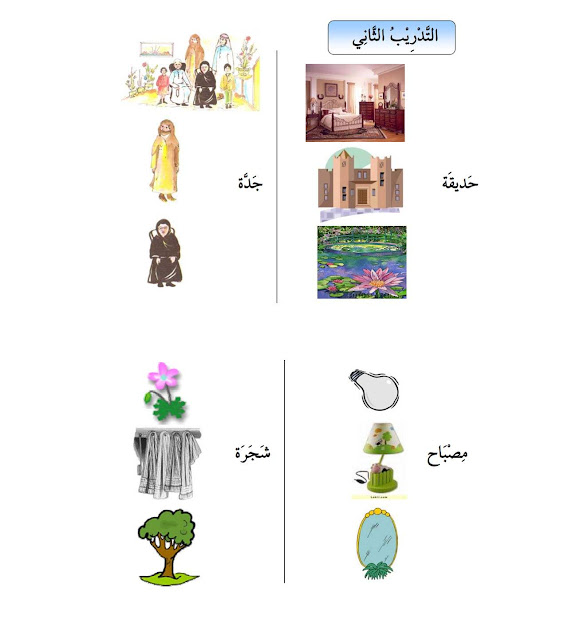
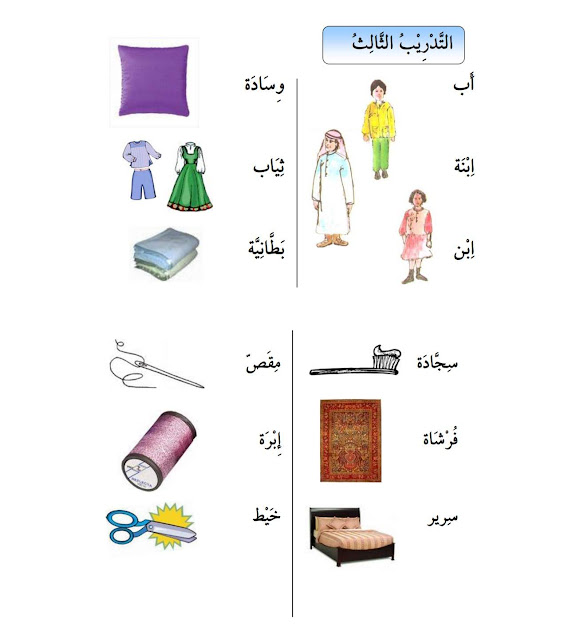
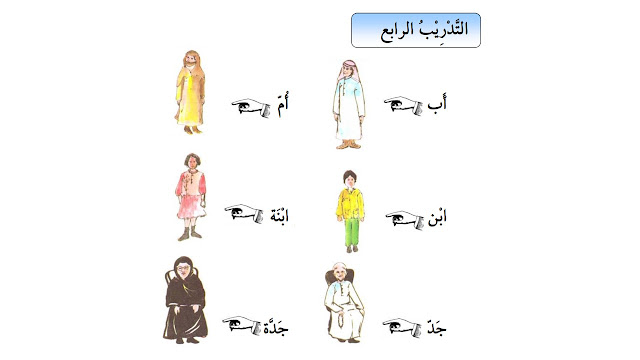
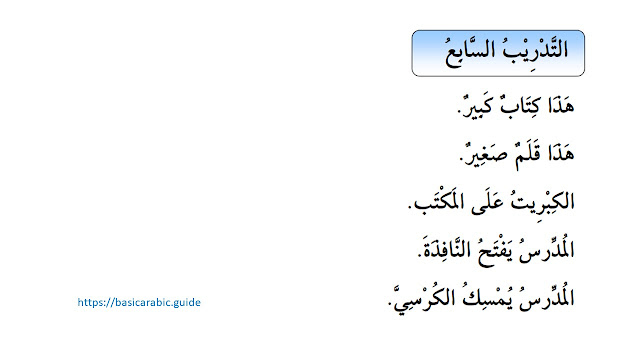
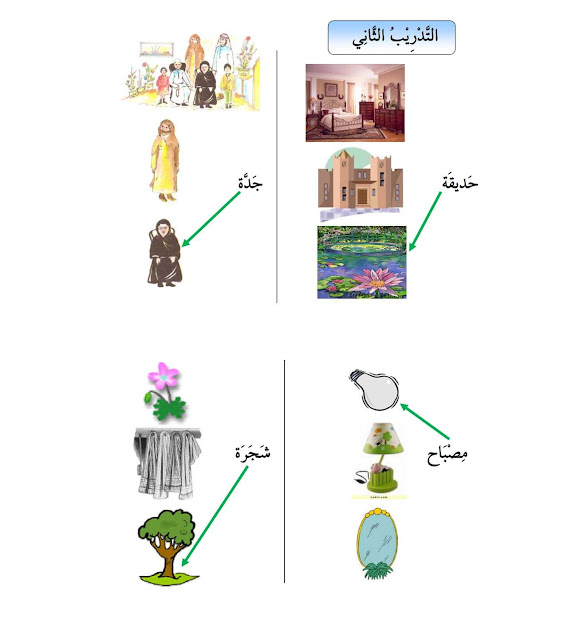
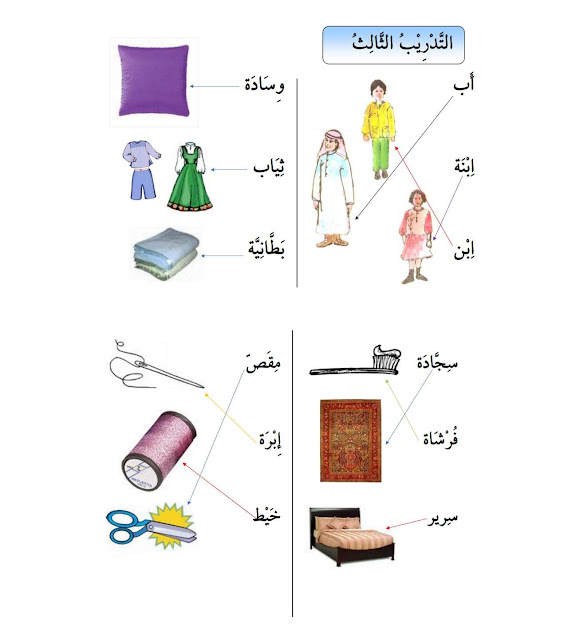
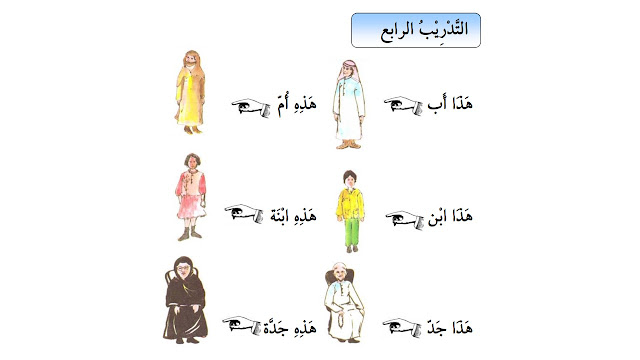
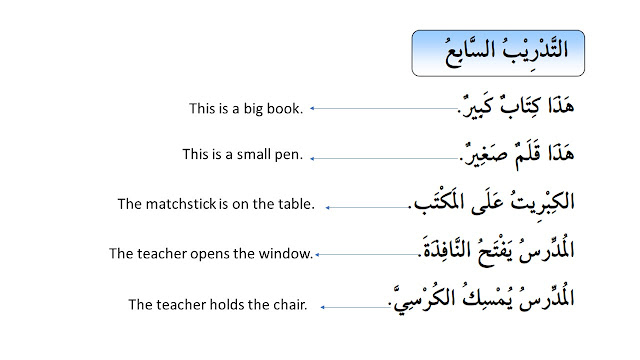
No comments:
Post a Comment